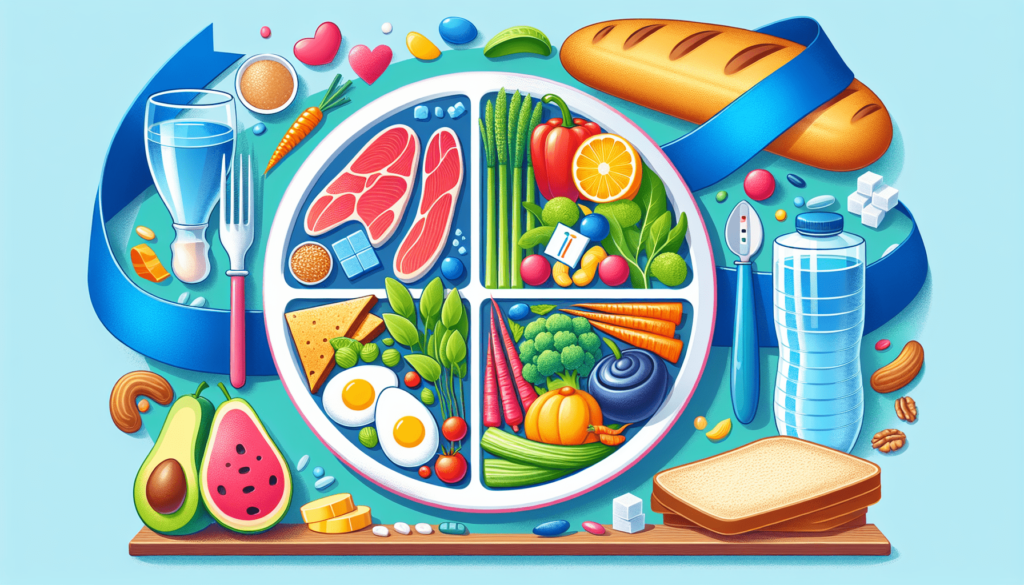Welcome to a helpful article on diabetes diet and food tips! Managing your diet is key in controlling blood sugar levels for individuals with diabetes. By making simple yet effective changes to your eating habits, you can better manage your condition and improve your overall health. In this article, we will discuss important dietary considerations for diabetics, as well as provide practical tips on how to make healthier food choices to keep your blood sugar levels in check. By implementing these tips, you can take control of your diabetes management and live a healthier, happier life. Have you been diagnosed with diabetes, or are you at risk of developing this condition? Whether you have type 1, type 2, or gestational diabetes, one of the most important aspects of managing this disease is following a healthy diet. What you eat can have a significant impact on your blood sugar levels and overall health. In this article, we will discuss diabetes diet and food tips to help you make informed choices when it comes to your nutrition. Let’s explore how you can create a balanced and delicious meal plan that supports your diabetes management.
Understanding Diabetes and Diet
Diabetes is a chronic condition in which your blood glucose levels are consistently elevated. This can happen due to inadequate insulin production (type 1 diabetes) or the body’s inability to use insulin effectively (type 2 diabetes). When it comes to diet and diabetes management, the goal is to regulate blood sugar levels and prevent complications such as heart disease, kidney damage, and nerve issues.
How Your Diet Affects Your Blood Sugar
The food you eat directly impacts your blood sugar levels. Carbohydrates, in particular, have the most significant effect on blood glucose. When you consume carbs, they are broken down into glucose and absorbed into the bloodstream, causing blood sugar levels to rise. Understanding how different foods affect your blood sugar is crucial in managing your diabetes effectively.
Creating a Balanced Diabetes Diet
A balanced diabetes diet consists of a variety of nutritious foods that help regulate blood sugar levels and support overall health. Here are some key components to consider when crafting your meal plan:
Carbohydrates
Carbohydrates are the main nutrients that affect blood sugar levels. However, not all carbs are created equal. Complex carbohydrates like whole grains, fruits, vegetables, and legumes are a healthier choice as they provide fiber, vitamins, and minerals. Refined carbohydrates like white bread, pasta, and sugary snacks should be consumed in moderation.
Proteins
Protein is essential for maintaining muscle mass, repairing tissues, and keeping you full and satisfied. Include lean sources of protein such as poultry, fish, tofu, legumes, and nuts in your meals. Opt for grilled, baked, or steamed protein sources instead of fried or breaded options.
Fats
Healthy fats are an important part of a balanced diet, especially for individuals with diabetes. Unsaturated fats found in olive oil, avocados, nuts, seeds, and fatty fish can help improve heart health and reduce inflammation. Limit saturated fats and avoid trans fats, as they can raise cholesterol levels and increase the risk of heart disease.
Fiber
Fiber is beneficial for managing blood sugar levels, promoting digestive health, and preventing constipation. Aim to include high-fiber foods like whole grains, fruits, vegetables, and legumes in your meals. Fiber-rich foods can help control blood sugar spikes and reduce the risk of developing complications associated with diabetes.
Portion Control
Monitoring portion sizes is essential when following a diabetes diet. Eating large portions of any food, even healthy ones, can cause blood sugar levels to spike. Use measuring cups, food scales, and visual cues to help you control portion sizes and prevent overeating.

Meal Planning for Diabetes
Meal planning is a key component of managing diabetes effectively. By preparing meals in advance, you can make healthier choices, control portion sizes, and avoid impulsive eating. Here are some tips for successful meal planning:
Plan Ahead
Take some time each week to plan your meals and snacks. Create a shopping list based on your planned meals to ensure you have all the necessary ingredients on hand. Consider batch cooking and freezing meals for convenience.
Include a Variety of Foods
Eating a diverse range of foods ensures you get all the essential nutrients your body needs. Incorporate a mix of fruits, vegetables, whole grains, lean proteins, and healthy fats into your meals. Experiment with different recipes and cuisines to keep your meals interesting and satisfying.
Control Blood Sugar Spikes
To prevent blood sugar spikes, aim to balance your meals with a combination of carbohydrates, proteins, and fats. Include high-fiber foods to slow down the absorption of glucose and promote stable blood sugar levels. Avoid skipping meals, as this can lead to erratic blood sugar fluctuations.
Snack Smart
Healthy snacks can help keep hunger at bay and prevent overeating during meals. Opt for nutrient-dense snacks like Greek yogurt, nuts, seeds, or raw vegetables. Avoid sugary snacks and beverages, as they can cause rapid blood sugar spikes.
Eating Out with Diabetes
Managing diabetes doesn’t mean you have to skip dining out altogether. With a few tips and tricks, you can enjoy meals at restaurants while keeping your blood sugar levels in check. Here’s how you can make healthier choices when eating out:
Research the Menu
Before heading to a restaurant, take a look at the menu online to see what options are available. Look for dishes that are grilled, baked, or steamed instead of fried. Choose dishes with lean proteins, whole grains, and plenty of vegetables.
Watch Portion Sizes
Restaurant portions tend to be larger than what you would typically eat at home. Consider splitting a meal with a dining companion or asking for a to-go box to portion out half of your meal before you start eating. Avoid all-you-can-eat buffets, as they can lead to overeating.
Be Mindful of Hidden Sugars
Some restaurant dishes may contain hidden sugars in dressings, sauces, and marinades. Ask for sauces and dressings on the side so you can control how much you consume. Opt for grilled or roasted options instead of dishes that are breaded or fried.
Limit Alcohol Consumption
Alcoholic beverages can affect blood sugar levels and interfere with diabetes medication. If you choose to drink alcohol, do so in moderation and opt for lower-sugar options like dry wine, light beer, or spirits mixed with sugar-free mixers.

Healthy Food Swaps for Diabetes
Making simple food swaps can have a significant impact on your blood sugar levels and overall health. Substitute high-calorie, high-sugar foods with healthier alternatives to support your diabetes management. Here are some healthy food swaps to consider:
White Rice ➔ Cauliflower Rice
Replace white rice with cauliflower rice for a low-carb, low-calorie alternative. Cauliflower rice is rich in fiber, vitamins, and minerals, making it a nutritious choice for individuals with diabetes.
Potato Chips ➔ Kale Chips
Trade greasy potato chips for crispy kale chips seasoned with herbs and spices. Kale chips are packed with antioxidants, fiber, and vitamins, making them a healthier snack option for managing blood sugar levels.
Soda ➔ Infused Water
Swap sugary sodas for refreshing infused water flavored with fruits, herbs, or vegetables. Infused water is hydrating, low in calories, and free of added sugars, making it an excellent choice for staying hydrated and supporting your diabetes management.
Ice Cream ➔ Greek Yogurt with Berries
Instead of indulging in sugary ice cream, opt for Greek yogurt topped with fresh berries. Greek yogurt is rich in protein and probiotics, while berries are low in calories and high in fiber and antioxidants, making this a satisfying and nutritious dessert option for individuals with diabetes.
Monitoring and Adjusting Your Diet
Monitoring your blood sugar levels regularly is essential in managing diabetes effectively. By tracking your food intake, exercise, blood sugar readings, and medication, you can identify patterns and make adjustments to your diet. Here’s how you can monitor and adjust your diet for optimal diabetes management:
Keep a Food Diary
Maintaining a food diary can help you track what you eat and how it affects your blood sugar levels. Note down your meals, snacks, portion sizes, and blood sugar readings throughout the day. Review your food diary regularly to identify trends and make changes to your diet accordingly.
Use a Blood Glucose Monitor
A blood glucose monitor allows you to check your blood sugar levels at home. Test your blood sugar before and after meals, as well as at different times of the day, to see how food, exercise, and medication affect your levels. Use the results to make informed decisions about your diet and lifestyle.
Consult with a Registered Dietitian
A registered dietitian can help you create a personalized meal plan tailored to your individual needs and preferences. They can provide guidance on portion sizes, food choices, and meal timing to help you manage your diabetes effectively. Regularly schedule appointments with a dietitian to monitor your progress and make necessary adjustments to your diet.
Work with Your Healthcare Team
Communicate with your healthcare team, including your primary care physician, endocrinologist, and diabetes educator, to discuss your diet and blood sugar management. Share your food diary, blood sugar readings, and any concerns or questions you may have about your diabetes management. Collaborate with your healthcare team to create a comprehensive plan that supports your overall health and well-being.
Conclusion
In conclusion, managing diabetes through diet is a lifelong journey that requires dedication, patience, and continuous learning. By following a balanced diabetes diet, meal planning, making healthy food swaps, and monitoring and adjusting your diet as needed, you can effectively manage your blood sugar levels and improve your overall health. Remember to consult with your healthcare team, including a registered dietitian, to develop a customized meal plan that meets your specific needs and supports your diabetes management. With the right tools and resources, you can take control of your diabetes and lead a happy, healthy life.


